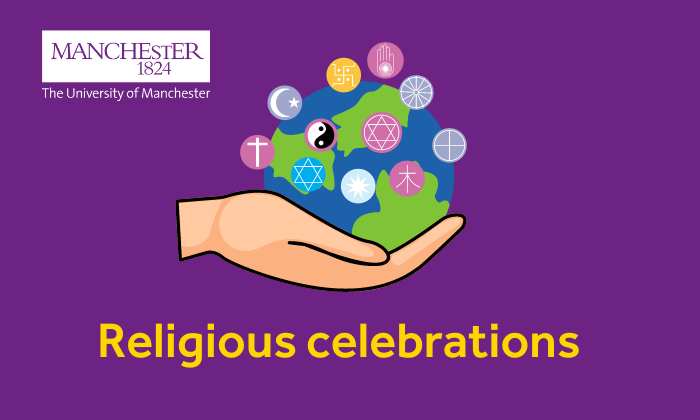Religious awareness days this May and June
29 Apr 2025
Observing religious celebrations this May and June

We recognise that many members of our University community will be observing a variety of religious traditions and celebrations in the coming weeks. They include:
May
Beltane (Wheel of the Year) Thursday, 1 May: Beltane falls halfway between the spring equinox and summer solstice, celebrating the peak of spring and the coming summer.
Vesak (Buddhism) Monday, 12 May: Vesak commemorates the birth, enlightenment, and death of Gautama Buddha.
Ascension of Christ (Christianity) Thursday, 29 May: This day commemorates Jesus' bodily ascent into heaven 40 days after his resurrection, marking the end of his earthly ministry and the beginning of his reign in heaven.
Shaheedi Sri Guru Arjan Dev Ji (Sikhism) Friday, 30 May: This day marks the martyrdom of the fifth Sikh Guru after being accused of supporting a rebellion against the Mughal Empire.
June
Shavuot (Judaism) Sunday, 1 to Tuesday, 3 June: Shavuot marks the giving of the Torah at Mount Sinai, observed with study, prayer, listening to the Ten Commandments being read in a Synagogue and eating dairy foods.
Hajj Day (Islam) Wednesday, 4 to Monday, 9 June: Hajj is pinnacle of the annual Islamic pilgrimage to Mecca, where millions of Muslims gather to perform sacred rituals, symbolising unity, devotion, and spiritual renewal.
Waqf al Arafa (Islam) Thursday, 5 to Friday, 6 June: The second day of the Hajj pilgrimage at Mount Arafat where the Islamic prophet Muhammad delivered one of his final sermons.
Eid al-Adha (Islam) Friday, 6 June: As part of the last rituals of Hajj, Eid al-Adha celebrates Ibrahim's devotion, marked by prayer, sacrifice, feasting, and charity, reflecting unity, gratitude, and compassion within the Muslim community.
Pentecost (Christianity) Sunday, 8 June: Pentecost commemorates the descent of the Holy Spirit on the Apostles and other followers of Jesus, marked now by church services with hymns and prayers themed around the Holy Spirit.
Litha (Summer Solstice) (Wheel of the Year) Saturday, 21 June: Litha marks the longest day and shortest night of the year, occurring when the sun reaches its highest point.
Muharram New Year (Islam) Thursday, 26 to Friday, 27 June: The first month of the Islamic calendar is marked worldwide by acts of worship, reflection and piety.
Jagannatha Rath Yatra (Hinduism) Friday, 27 June: The chariot festival is celebrated with a ceremonial procession of Lord Jagannath, Balabhadra, and Subhadra in elaborately decorated chariots.
Sacred Heart of Jesus (Christianity – Catholicism) Friday, 27 June: This popular Catholic devotion focuses on the heart of Jesus as a symbol of God's boundless love and mercy.
St. Peter & St. Paul (Christianity) Sunday, 29 June: St. Peter and St. Paul are both honoured on this day to commemorate their executions, which typically involves special masses and services.
Following our EDI Diversity Calendar, we focus on the six major world faiths currently represented within our community – Buddhism, Christianity, Hinduism, Islam, Judaism, and Sikhism. This does not mean we do not recognise that there are many more faiths equally as important.
We also recognise that a large proportion of our community may have no religion or belief or observe other secular events.
More information
We aim to take an integrated approach that celebrates individuals and their many identities to ensure that we are truly inclusive of all our community. This is set out in our Equality, Diversity and Inclusion strategy. Equality, Diversity and Inclusion: Religion or belief (including no belief).
- Multi-faith chaplaincy;
- Our Staff Networks are a great way to connect with the wider University community. To find out more email the EDI Team at equalityanddiversity@manchester.ac.uk;
- Visit our EDI blog - a place where colleagues can share their thoughts and insights related to equality, diversity and inclusion.
